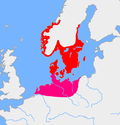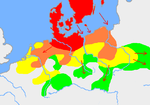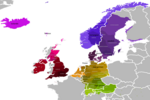 | The Germanic languages are a branch of the Indo-European language family spoken natively by a population of about 515 million people mainly in Europe... 92 KB (9,399 words) - 17:48, 11 April 2024 |
 | The North Germanic languages make up one of the three branches of the Germanic languages—a sub-family of the Indo-European languages—along with the West... 57 KB (5,429 words) - 10:22, 25 March 2024 |
 | The West Germanic languages constitute the largest of the three branches of the Germanic family of languages (the others being the North Germanic and the... 57 KB (4,752 words) - 23:00, 22 April 2024 |
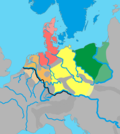 | East Germanic is one of the primary branches of Germanic languages, along with North Germanic and West Germanic. The only East Germanic language of which... 9 KB (917 words) - 00:43, 25 February 2024 |
 | which there are eight groups with languages still alive today: Albanian, Armenian, Balto-Slavic, Celtic, Germanic, Hellenic, Indo-Iranian, and Italic;... 111 KB (10,129 words) - 22:09, 29 April 2024 |
The Germanic languages include some 58 (SIL estimate) languages and dialects that originated in Europe; this language family is part of the Indo-European... 15 KB (1,120 words) - 00:22, 20 January 2024 |
 | North Sea Germanic, also known as Ingvaeonic (/ˌɪŋviːˈɒnɪk/ ING-vee-ON-ik), is a postulated grouping of the northern West Germanic languages that consists... 10 KB (1,100 words) - 09:07, 9 April 2024 |
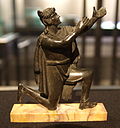 | the use of ancient and early medieval Germanic languages and are thus equated at least approximately with Germanic-speaking peoples, although different... 163 KB (20,172 words) - 09:20, 29 April 2024 |
the group of Germanic languages—a stricter term for that same proposition, but with an alternative chronography, is Proto-Germanic language. As an identifiable... 11 KB (1,247 words) - 19:35, 5 March 2024 |
The Germanic substrate hypothesis attempts to explain the purportedly distinctive nature of the Germanic languages within the context of the Indo-European... 14 KB (1,707 words) - 13:34, 8 April 2024 |
took place separately in various Germanic languages starting around 450 or 500 CE and affected all of the early languages except Gothic. An example of the... 52 KB (5,283 words) - 23:04, 25 March 2024 |
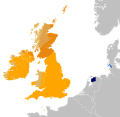 | Frisian) varieties of the West Germanic languages. The Anglo-Frisian languages are distinct from other West Germanic languages due to several sound changes:... 24 KB (1,613 words) - 17:43, 3 May 2024 |
He divides Germanic into a North Germanic and a South Germanic (or Continental Germanic) group, with the Scandinavian (or Nordic) languages and the extinct... 5 KB (567 words) - 22:57, 11 January 2024 |
 | Northwest Germanic is a proposed grouping of the Germanic languages, representing the current consensus among Germanic historical linguists. It does not... 10 KB (1,207 words) - 08:10, 21 April 2024 |
research into the Germanic languages began in the 16th century, with the discovery of literary texts in the earlier phases of the languages. Early modern... 4 KB (356 words) - 21:40, 9 March 2024 |
divided into North, West and East Germanic groups, and ultimately produced a large group of mediaeval and modern languages, most importantly: Danish, Norwegian... 29 KB (2,932 words) - 16:56, 19 April 2024 |
of the Germanic languages List of ancient Germanic peoples and tribes Germanic languages Proto-Germanic language, a reconstructed proto-language of all... 797 bytes (121 words) - 17:25, 11 December 2021 |
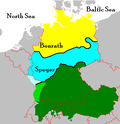 | High German consonant shift (redirect from High Germanic languages) Proto-Germanic, the resulting language, Old High German (henceforth, OHG), can be neatly contrasted with the other continental West Germanic languages, which... 60 KB (6,422 words) - 12:28, 15 April 2024 |
In the Germanic languages, weak verbs are by far the largest group of verbs, and are therefore often regarded as the norm (the regular verbs). They are... 60 KB (5,117 words) - 07:44, 14 March 2024 |
more to the late time of attestation of Germanic than to any inherent "simplicity" of the Germanic languages. As an example, there are fewer than 500... 59 KB (6,256 words) - 20:49, 13 April 2024 |
to other unrelated sound-changes which later affected individual Germanic languages.) *hurną > Old English horn "horn" *wiraz > Old English wer "man"... 12 KB (1,525 words) - 05:00, 27 April 2024 |
 | proto-languages. North Sea Germanic Weser–Rhine Germanic Stefan Müller, Germanic syntax: A constraint-based view, series: Textbooks in Language Sciences... 6 KB (483 words) - 05:49, 6 April 2024 |
Scandinavian languages. This common, but not direct, ancestor (proto-language) of all contemporary Germanic languages is called Proto-Germanic, commonly... 16 KB (1,616 words) - 04:29, 22 February 2024 |

